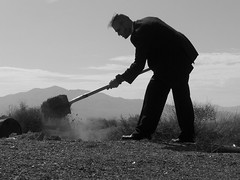Americans in recent weeks have added a new word to their political vocabulary: bailout. They may have known this word before, but recent examples have assuredly serve to inculcate its meaning in their mind.
Bailouts themselves are not bad; if a company is in financial trouble, it becomes a prime opportunity for an interested investor to buy low in order to sell high (hopefully) at a later date. This is essentially how the market works—we all want to buy things on the cheap. But bailouts are unique in that the company is clearly about to go under, and thus immediate and drastic action is necessary to prevent its demise.
Companies are saved either through private or public intervention. Corporate bailouts sponsored by the government are publicly financed, in that the taxpayer foots the bill. Regardless of whether the money is generated through tax revenue, foreign debt, or printing new money, it is the taxpayer in this situation that suffers (economically and in other ways) as a result.
The question I have (which I have asked too many times before) is, “where does the federal government get the authority to bail out a company?” The only defense offered by statist pundits is “But Company X is too big and important, we just can’t let them go under! Think of what that would do to the economy!”
And so on that basis alone (the perceived catastrophic effect of what would happen if Company X failed), those with the purse strings provide the money to bail out one company with our money.
It has happened several times throughout our history, and it’s happening with increasing frequency as shareholder confidence declines across the board. The recent bailout of IndyMac will clean out 10% of the FDIC’s holdings. A few more of those, and supposedly insured depositors will begin to worry about their money regardless of which bank they patronize—then we will see what a twenty-first century bank run looks like.
As this article explains (with a bit of satire), the supreme law of the land nowhere grants the federal government the power to steal my money to help a troubled company:
The American Constitution is missing a word. There was a word left out that our Founders failed to recognize as important. The word is “Bailout.” There is nothing in that document that allows the government to bailout someone whose house burned down, or a car company, or someone with medical problems, or someone who spent too much on a house they could not afford, or a bank that made bad loans.
To be clear: federal politicians have granted themselves the ability to prevent companies from failing on the subjective, predictive assertion that to do otherwise would lead to economic turmoil. I contend that it is precisely because of such bailouts (and all other government-sponsored economic intervention) that we have such economic turmoil at all. Robert Lefevre got it right: “Government is a disease that masquerades as its own cure.”
Ludwig von Mises had this to say about the government’s bailout of corporations:
All these champions of interventionism fail to realize that their program thus implies the establishment of full government supremacy in all economic matters and ultimately brings about a state of affairs that does not differ from what is called the German or the Hindenburg pattern of socialism. If it is in the jurisdiction of the government to decide whether or not definite conditions of the economy justify its intervention, no sphere of operation is left to the market. … [T]he market is free as long as it does precisely what the government wants it to do. It is “free” to do what the authorities consider to be the “right” things, but not to do what they consider the “wrong” things; the decision concerning what is right and what is wrong rests with the government. Thus the doctrine and the practice of interventionism ultimately tend to abandon what originally distinguished them from outright socialism and adopt entirely the principles of totalitarian all-around planning. (Ludwig von Mises, Human Action, p. 723-4)
“Totalitarian all-around planning”, as Mises called it, is commonly referred to in our day as “central planning”. Such a system exists in the United States in the form of the Federal Reserve, comprised of a few unelected individuals having supreme power over the finances of the economy. No oversight, no accountability to the people, no audits, and no checks and balances. They are the ones that bail out companies with forced public financing.
The government and their economic cronies at the Fed are to blame for creating the booms and busts throughout the past century. And now, despite the fact that they have no Constitutionally-granted power to do so, they want to use our money to save companies with questionable balance sheets, ethics, and business practices. This may work in the short run, but the ultimate and long-term result is one of financial insolvency.
Continue reading at the original source →




